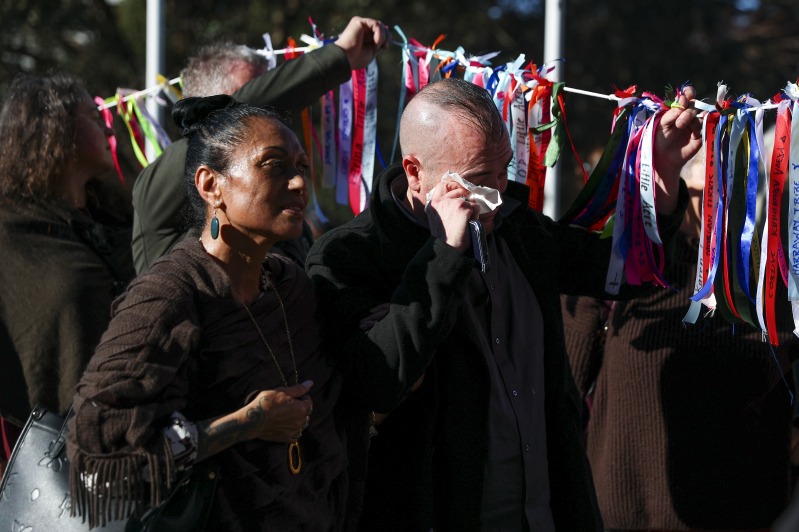
Church leaders in New Zealand have been responding to the publication of a devastating Abuse in Care report by the Royal Commission of Inquiry recounting the abuse and neglect suffered by many thousands of vulnerable children and adults in the hands of church and state institutions from 1950 to1999.
The report detailed patterns of abuse and neglect for 200,000 vulnerable children, youth and adults, out of 650,000 in care during the period, with 2,329 survivors telling their stories. The narratives of some of the abuse victims will never be known - they died in ‘care’ or committed suicide.
Entitled Whanaketia, meaning ‘Through pain and trauma, from darkness to light’, the report contained a challenge to faith leaders to apologize.
In this second of a two-part report on the concluded investigation, Christian Daily International highlights the initial responses to the findings by church leaders, including those from church institutions linked to abuse and neglect mentioned in the report.
Rev. Alan Vink spoke to Christian Daily International in a personal capacity. He has worked as a baptist pastor for 25 years and in a Bible college teaching and leadership development role in the past 16 years, which involves writing and speaking on issues relevant to churches and faith organizations in New Zealand.
Vink said the name of the report, highlighting the pain and trauma, reflected the journey of the survivors, “from being horribly mistreated and neglected, isolated, abandoned, unseen, and not listened to – to being heard, telling their experiences, being taken seriously and now looking to the light for healing and restoration. As Christian communities we know something about this. My prayer is that our light will shine ever so brightly in our responses to this inquiry as we go forward.”
Vink has recommended that Christians in New Zealand read the report carefully, adopt a humble posture, pray for God’s leading and discern how to respond, discuss the disclosed issues in leadership teams and decide how local churches should respond, and also discuss the report in pastors’ groups.
The Rev. Stuart Lange, national director of the New Zealand Christian Network, sent a message to members, expressing anguish and “deep sorrow for those who have suffered.” He called the fact that much abuse took place in church-related institutions “doubly appalling” and “completely inexcusable.”
“It is fair to say that, from a Christian and biblical perspective, any form of abuse is invariably wrong and evil. All such abuse goes against core Christian values: goodness, kindness, respect, compassion, integrity, and self-control. Abuse of others can never be justified, never be defended, never be overlooked.”
Lange called on churches to be vigilant and “do everything we possibly can to prevent abuse ever happening in our own spaces.”
Churches should “waste no time” in organizing safety and reporting systems, he said, and all Christians need to pray about the issue.
Prayer points he highlighted include the government and churches fully facing the “awful truth of what happened”, that the abusers would find true repentance and remorse, for the survivors to find healing and for vulnerable people to be protected in the future.
Christian Daily International approached each of the church denominations specifically mentioned in the Abuse in Care report – Anglican, Catholic, Presbyterian, Methodist and Salvation Army – and asked for their comment on the report.
Ady Shannon, editor for Touchstone, a newspaper representing the Methodist Church of New Zealand, said that, “as with every person in Aotearoa”, the church body deplored “the actions of the many people who caused so much harm to so many.”
“The abuse of power and the wilful ignoring of the voices of those impacted is a cause of national shame and sadness for all the broken lives.”
Shannon referred to the report naming the abuse and neglect of so many vulnerable people a “national disgrace” and an injustice needing a redress.
“In terms of our church response, it has included a swift and unconditional apology – to the commission and to the survivors - redress for survivors, the implementation of procedures that will protect the vulnerable, extensive training programmes around safeguarding and transparency about the identities of those involved.”
Shannon highlighted the “heartfelt, honest and open disclosure” given by the New Zealand Methodist general secretary, Rev. Tara Tautari, after watching various faith-based leaders at the inquiry hearings.
“The transcript of her presentation is available on the Royal Commission of Inquiry website. In acknowledging the pain and courage of the survivors, she offered an unconditional apology and a promise to make amends and changes to ensure such a chapter is never repeated.”
Shannon also referred to the May edition of Touchstone, containing a feature by Rev. Taurtari outlining further how the Methodist church intends to respond to the report in the future. A ‘Liturgy of Lament’ has been devised by Rev. David Poultney, Methodist Chair of Faith and Order, to “express our pain, sorrow, and institutional guilt in lament”. The lament is published in English, Te Reo, Fijian, Samoan and Tongan languages, and is to be used in the country’s Methodist churches in response to the report.
Shannon added that the general secretary had met many survivors of the reported abuse and neglect and “will continue to do so.”
Shannon hoped that “the actions of the Methodist Church will truly reflect a faith-driven response of aroha, reflection, redress and change to ensure history never repeats.”
Rev Wayne Matheson, Presbyterian Assembly Executive Officer, also acknowledged the publication of the report.
“The Presbyterian Church of Aotearoa New Zealand will now carefully read this substantial report and bring its full attention to any recommendations and learnings the Commission has for the Presbyterian Church,” Matheson said. “We will respond to you [Christian Daily International] once we have given the report the respect, careful and thoughtful consideration it deserves.”
Julianne Clarke-Morris, editor of Anglican Taonga Online, for the Anglican Church in Aotearoa New Zealand and Polynesia Media Office, referred to Chris Wikaira, managing media comments for the Anglican church on the report. Wikaira has yet to respond to Christian Daily International.
However, Clarke-Morris also referenced a joint statement from Anglican Archbishops Don Tamihere, Justin Duckworth and Sione Ulu'ilakepa issued when the report was published on July 24.
“We acknowledge and take full responsibility for our failures to provide the safe, caring and nurturing environment those who have been in our care had a right to expect and to receive.
“There have been clear failures to properly investigate and respond when abuse was reported. We acknowledge that we have not provided accessible, straightforward processes for the handling of disclosures and complaints of abuse.
“We have also failed to provide accessible, trustworthy, and consistent processes of redress.”
“We are committed to making our selection, screening, training and professional development processes more transparent, consistent, and accountable; and ensuring that all our communities are constantly monitoring and reviewing their approach to safeguarding.”
The archbishops said it was crucial that the whole church took direction and advice on the issue: “We know that we still have a long way to go.”
“We call on all who identify as Anglican; whether churches, schools or agencies to study this report and its recommendations and to commit themselves to the principles and practices that ensure the highest standards of pastoral care.
“We call on all Anglican entities to commit to a common approach to ensure that anyone making disclosures of abuse or seeking redress does not have to navigate complex and disconnected processes.
“Our apology at the Royal Commission to survivors of abuse was heartfelt and genuine and we can only stand in awe of their courage and endurance. We encourage any other survivors of abuse who have not yet come forward to do so.”
The archbishops also support “in principle” the establishment of an independent authority for the handling of any future complaints.
Meanwhile, Salvation Army Chief Secretary Gerry Walker also acknowledged the publication of the report and commended the bravery of all survivors contributing to the inquiry.
“We also appreciate the thorough and comprehensive nature of the Inquiry,” Walker said. “We are currently reviewing the report and its recommendations, and are not yet in a position to offer further detailed comments beyond this statement.
“We are profoundly sorry for the suffering experienced by those in our care.
“We recognise the immense courage it takes for survivors to revisit and share their traumatic experiences, which should never have happened. The pain and harm inflicted on these individuals were deeply unjust and have had lasting impacts on them and their loved ones. There is no excuse for these actions, and it is heartbreaking that they occurred within an organization dedicated to serving a God of love.”
Words alone cannot “mend the wounds that have been caused”, Walker added.
“The Salvation Army is fully committed to listening to survivors and learning from this Royal Commission. This commitment extends not only to our redress processes but also to any recommendations made to better support those harmed in our care in the past and to ensure the safety and well-being of all vulnerable individuals accessing our services today.”
For the Catholic Church, a joint statement was issued by the Rev. Steve Lowe, President of the New Zealand Catholic Bishops Conference, and the Rev. Thomas Rouse Congregational Leaders Conference Aotearoa New Zealand, saying the Catholic Church had made “significant progress” in responding to abuse reports in the past 30 years but work is still needed to ensure church communities are safe places for people.
“The Catholic bishops and congregational leaders in Aotearoa New Zealand have received a copy of the inquiry’s final report and will now read and review it carefully. As we have done throughout the length of the inquiry, we will ensure that action follows our review of the inquiry’s findings.
“There is work for the government to do and work to be undertaken by many other people.
“We understand that within the community, some of us - including leaders in the catholic church - have a special role to play to ensure that the findings and recommendations of this significant Inquiry are not lost or confined to words in a report. We commit to that role.
“At the same time, everyone must play their part in responding to the Inquiry’s report to the extent that they can. There are things that all of us can and must do to eliminate abuse of any kind in whatever context we live and work in.
“We hope this report and the work that flows from it will result in a better society and a safer environment for all people.”
Abuse is not only historical, or confined to sole parts of society, the Catholic leaders stated and the survivor’s accounts “make that crystal clear.”
The Catholic leaders referred to a public letter published in an undisclosed setting on January 10 2023, acknowledging “the abuse of people in the care of the church is real and the failures of church leaders in responding to reports are real.”





